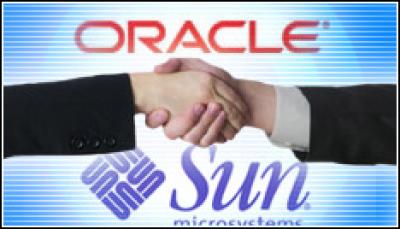US DOJ Approves Oracle-Sun Deal

Java licensing apparently was the reason federal due diligence in the Oracle acquisition of Sun Microsystems ran longer than anticipated
Four months to the day after Oracle CEO and co-founder Larry Ellison announced Oracle’s intent to acquire longtime enterprise IT partner Sun Microsystems for $7.4 billion (£4.5bn), the U.S. Department of Justice on 20 Aug officially sanctioned the deal as not threatening to break federal antitrust laws.
The DOJ, the highest-ranking law enforcement agency in the United States, is empowered to study the potential abuse of antitrust law in corporate mergers and acquisitions—especially those involving multibillion-dollar companies such as Oracle and Sun.
The EC is the antitrust watchdog wing of the European Union. It will look closely at two key aspects of the merger: the Java networking software franchise and the enterprise parallel database business—two sectors in which Oracle will greatly increase its market share.
The DOJ took its time performing due diligence in this case, using several weeks more than originally had been expected to clear the transaction. Two months after the deal was announced, the DOJ extended its investigation, and it ultimately lasted two more months.
At the time of the due diligence extension, a Sun spokesperson told eWEEK that the company wasn’t worried, and characterised the delay as simply an “irritation.”
“This is not unexpected,” said the spokesperson, who asked not to be identified. “The new administration is looking [more closely] at all mergers and acquisitions, by necessity. They’re looking deeply into all aspects of the economy. This is too big a transaction for them to simply let go through on the first pass.”
One of the key areas of concern for the DOJ apparently was licensing of Sun’s ubiquitous networking software, Java. If the deal closes, Oracle will own the lion’s share of the world’s Web-based networking software—in millions of endpoint devices and in thousands of data centres and smaller IT systems.
Java works as well in handheld devices as it does in king-size enterprise servers and storage arrays; its influence on worldwide software development is huge.
All of Oracle’s middleware runs on Java. More than 90 percent of the world’s cell phones and connected portable devices use Java networking software to run on Web-based networks, and a growing percentage of the world’s smart cards—an estimated 40 percent, according to IT research companies—use embedded Java chips to store personal, health and business information that can be accessed by card readers.
Java licensing is tricky to untangle, because up until November 2006, Java was a proprietary programming language owned in its entirety by Sun and licensed accordingly. From 1995 to 2006, Sun charged for licensing use of Java code and for affiliated services; now it gives away the code free of charge under a choice of open-source licenses, but still charges for implementation, ongoing maintenance and other services.
At the time the merger was announced back in April, Ellison noted that “all of our middleware is based 100 percent on Java” and said his company has “invested more than anybody else in Java technology in terms of dollars over the years, and we intend to invest—and accelerate our investments—going forward.”